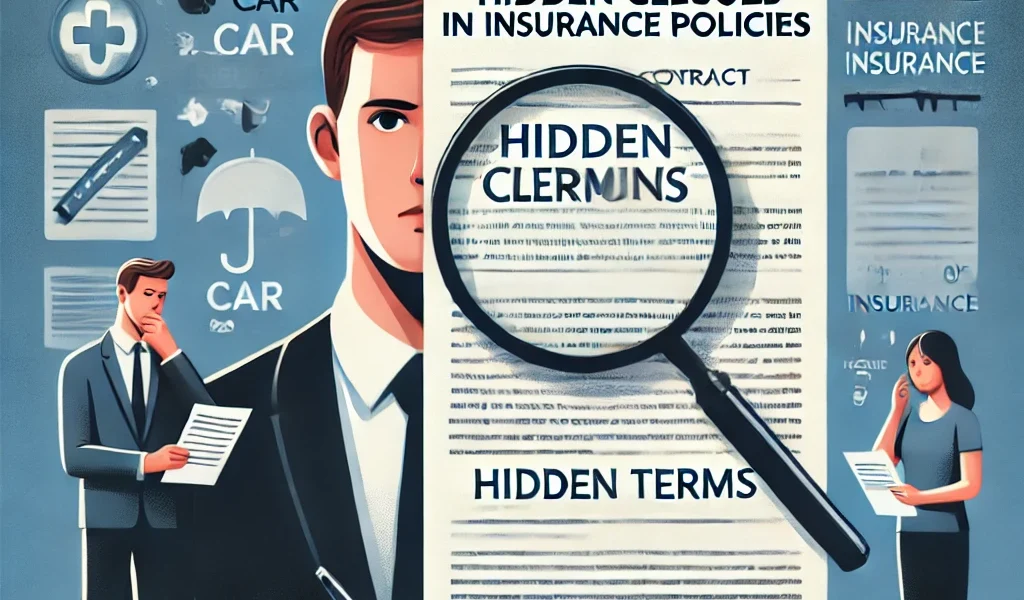Introduction
Insurance policies are designed to provide financial protection against unforeseen events, but many policyholders are unaware of the hidden clauses that could impact their claim settlement. These clauses are often buried in the fine print and can lead to claim denials or reduced payouts. Understanding these hidden clauses is crucial to ensuring that you get the compensation you deserve when filing a claim.
This guide will highlight the most common hidden clauses in insurance policies and provide insights on how to avoid unpleasant surprises when making a claim.
Common Hidden Clauses That Impact Claim Settlements
1. Pre-Existing Condition Exclusions
Many health and life insurance policies exclude coverage for pre-existing conditions, which are medical conditions diagnosed before the policy was purchased.
How It Affects You:
- Claims related to pre-existing conditions may be denied.
- Some policies have a waiting period before covering such conditions.
How to Avoid Issues:
- Disclose all medical conditions when purchasing a policy.
- Read the waiting period details in the policy document.
2. Sub-Limits on Coverage
Sub-limits impose restrictions on the amount that can be claimed for specific expenses, even if the overall sum insured is high.
How It Affects You:
- Hospital bills may exceed the sub-limit for room rent or ICU charges, leaving you to cover the excess amount.
- Some policies have sub-limits for specific surgeries, treatments, or diseases.
How to Avoid Issues:
- Check for sub-limits before purchasing a policy.
- Choose policies with higher or no sub-limits for critical expenses.
3. Co-Payment Clauses
A co-payment clause requires the policyholder to pay a percentage of the claim amount out-of-pocket.
How It Affects You:
- Increases your financial burden during a claim.
- Common in health and motor insurance policies.
How to Avoid Issues:
- Opt for policies with lower or no co-payment requirements.
- Understand the co-payment structure before buying.
4. Exclusions for Natural Disasters and Acts of War
Some policies exclude coverage for damages caused by natural disasters, war, or riots.
How It Affects You:
- Claims for earthquake or flood damages may be denied if not explicitly covered.
- Many travel insurance policies exclude acts of terrorism.
How to Avoid Issues:
- Check whether your policy includes coverage for natural disasters.
- Purchase add-on riders for disaster coverage if necessary.
5. Waiting Periods for Coverage Activation
Many insurance policies impose waiting periods before coverage becomes effective.
How It Affects You:
- Health insurance policies typically have waiting periods for maternity benefits and pre-existing conditions.
- Claims made within the waiting period are often rejected.
How to Avoid Issues:
- Plan for insurance coverage well in advance.
- Choose policies with shorter waiting periods.
6. Non-Disclosure and Misrepresentation Clauses
Failure to disclose relevant information or providing incorrect details can lead to claim rejection.
How It Affects You:
- Insurers can void policies due to misrepresentation or non-disclosure.
- Even minor inaccuracies in application forms can cause issues.
How to Avoid Issues:
- Be truthful and transparent while filling out policy forms.
- Update the insurer about any changes in health or asset conditions.
7. Depreciation Clause in Motor Insurance
Standard motor insurance policies account for depreciation when settling claims, reducing the payout amount for parts replacement.
How It Affects You:
- Older vehicles may get significantly lower claim amounts due to depreciation.
- Only a partial cost of repair may be covered.
How to Avoid Issues:
- Opt for zero-depreciation add-on coverage.
- Understand the depreciation rates applied to different vehicle parts.
8. Claim Filing Deadline
Most policies require claims to be filed within a specific period after the event.
How It Affects You:
- Late claims may be outright rejected.
- Many health and motor insurance claims have strict time limits.
How to Avoid Issues:
- Be aware of claim submission deadlines.
- File claims as soon as possible with proper documentation.
9. Contribution Clause in Multiple Policies
If you have multiple insurance policies covering the same risk, insurers may apply a contribution clause where each insurer pays only a proportion of the claim.
How It Affects You:
- You may not receive full compensation from one policy.
- Claim settlement may become complicated due to multiple insurers involved.
How to Avoid Issues:
- Clarify the contribution clause with your insurer.
- Choose a primary insurer and coordinate claims accordingly.
10. Occupation and Lifestyle Exclusions
Some life and health insurance policies have exclusions based on occupation or lifestyle choices.
How It Affects You:
- High-risk professions (e.g., pilots, miners) may not be covered.
- Participation in adventure sports may void claims.
How to Avoid Issues:
- Disclose your profession and lifestyle habits when purchasing insurance.
- Look for specialized coverage if engaged in high-risk activities.
How to Protect Yourself from Hidden Clauses
- Read the Fine Print: Always review policy documents carefully before signing.
- Ask Questions: Clarify doubts with the insurer or agent about exclusions and limitations.
- Compare Policies: Don’t just choose the cheapest option—compare benefits and terms.
- Opt for Add-Ons: Consider additional riders for comprehensive coverage.
- Stay Updated: Keep track of policy changes and renewals.
Conclusion
Hidden clauses in insurance policies can significantly impact your claim settlement, leading to financial loss and frustration. By being aware of these clauses and carefully reviewing your policy terms, you can avoid unexpected claim denials. Always ensure that you understand the terms and conditions before purchasing insurance, and if needed, seek professional advice to get the best coverage without hidden pitfalls.
Have you encountered any hidden clauses in your insurance policy? Share your experience in the comments!




